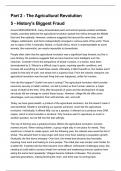Resume
Summary Sapiens - Yuval Noah Harari - Part 2: The Agricultural Revolution
This is a comprehensive summary of the second part of the book Sapiens: A History of Humankind. It covers each chapter with distinct subtitles, making it easy to navigate. I created this summary while reading the book, making it ideal for those looking for a quick overview. It's also available as p...
[Montrer plus]




